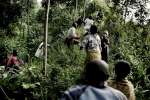- Text size
 |
|  |
|  |
| 
- Français
Dramatic rise in numbers of Congolese returning home from Zambia
News Stories, 5 November 2009
LUSAKA, Zambia, November 5 (UNHCR) – The number of Congolese refugees repatriated from Zambia this year has passed the 15,000 mark, a dramatic increase on the figures for 2007 and 2008.
On Wednesday evening, a UNHCR-chartered boat carrying 502 refugees left the Zambian port of Mpulungu on Lake Tanganyika and set sail for the lakeside towns of Moba and Kalemie in the Democratic Republic of the Congo (DRC).
It brought the number of Congolese repatriated this year from Zambia with UNHCR help to more than 15,600. This compared to some 9,700 for the whole of last year and more than 7,300 in 2007. The 15,000 mark, itself, was passed a little earlier.
Senior UNHCR Programme Officer Kristine Hambrouck said the dramatic rise in return figures this year was due to a variety of reasons. These included stepped up information campaigns; visits by senior UNHCR staff, government officials and donors to the camps in Zambia; regular discussions with refugees on the conditions in DRC; enhanced return and reintegration packages; stability and development in return areas; and encouragement from those who have returned.
Zambian Deputy Minister of Home Affairs David Phiri and other dignitaries were on hand to wave farewell to the refugees at Mpulungu and to mark the passing of the 15,000 mark. Phiri thanked UNHCR, other partners and donors for helping Zambia reach the repatriation milestone.
UNHCR Representative to Zambia James Lynch said he was happy at the pace of voluntary repatriation this year, but called on more Congolese refugees to go home before the repatriation programme wraps up at the end of December. "UNHCR stands ready to assist any Congolese refugee who comes forward to repatriate," Lynch stressed.
Derek Fee, head of a European Commission delegation, noted that funding was increasingly being channelled towards reintegration projects in the DRC. He also urged more Congolese refugees to return home, where donors will help them reintegrate. The Commission part funds the repatriation programme.
Zambia currently hosts less than 30,000 Congolese refugees. Most fled their homeland a decade ago at the height of the civil strife in DRC.














































